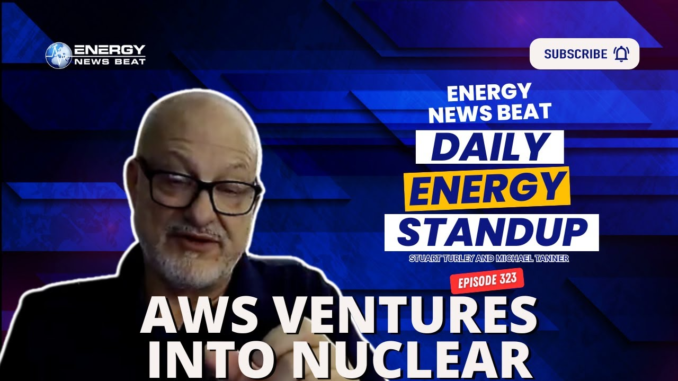
Daily Standup Top Stories
AWS acquires Talen’s nuclear data center campus in Pennsylvania
Amazon Web Services (AWS) has acquired Talen Energy’s data center campus at a nuclear power station in Pennsylvania. Talen Energy Corporation this week announced it has sold its 960MW Cumulus data center campus in Pennsylvania […]
Electric vehicles release more toxic emissions, are worse for the environment than gas-powered cars: study
Electric vehicles release more toxic particles into the atmosphere and are worse for the environment than their gas-powered counterparts, according to a resurfaced study. The study, published by emissions data firm Emission Analytics, was released […]
The ‘greenest’ car in America might surprise you
If you try to imagine a “green” car, an electric vehicle is probably the first thing that comes to mind. A silent motor with tons of torque; no fumes, gasoline smells or air pollution belching […]
Carbon capture, utilization, and storage (CCUS) – effective technology or convenient scam?
Many people in high-income nations (and few in lower-income nations) are concerned about emissions of greenhouse gases (GHGs), particularly carbon dioxide (CO2), and their effects on climate. Behind the media furore and polarized sniping, there […]
New Study Warns Midwest and Mid-Atlantic Electric Grid Could Face Blackouts by 2028
A new study warns that the Biden administration-backed push to electrify America’s economy is on a collision course with its policy of retiring “base load” power plants as part of its green agenda. As a […]
Energy Realities EP#101 LIVE with special guest Robert Bryce on his new Documentary!
Energy Realities EP#101 LIVE with special guest Robert Bryce on his new Documentary! Don’t miss the great LIVE panel for the Energy Realities team: David Blackmon, Tammy Nemeth, Irina Slav, and Stu Turley. Robert Bryce’s […]
Highlights of the Podcast
00:00 – Intro
02:02 – AWS acquires Talen’s nuclear data center campus in Pennsylvania
03:44 – Electric vehicles release more toxic emissions, are worse for the environment than gas-powered cars: study
05:23 – The ‘greenest’ car in America might surprise you
07:01 – New Study Warns Midwest and Mid-Atlantic Electric Grid Could Face Blackouts by 2028
08:34 – Energy Realities EP#101 LIVE with special guest Robert Bryce on his new Documentary!
09:56 – Carbon capture, utilization, and storage (CCUS) – effective technology or convenient scam?
12:52 – Outro
Follow Stuart On LinkedIn and Twitter
Follow Michael On LinkedIn and Twitter
– Get in Contact With The Show –
Video Transcription edited for grammar. We disavow any errors unless they make us look better or smarter.
Stuart Turley: [00:00:14] Hello, everybody. Welcome to the Energy News Beat Daily. Stand up. My name’s Stu Turley, president and CEO of the sandstone Group. Today is March 6th. I hope everybody went out and voted. Should be an absolutely fantastic day. Today is. Here are the stories AWS acquires Talen’s Nuclear Data Center campus in Pennsylvania. Pretty cool if you’re going to have a data center. Nothing wrong with some nuclear electric vehicles. Release more toxic emissions and are worse for the environment than gas powered static cars. Wow. I found this interesting because it gave some good facts. About that. Let’s see. The greenest car in America might surprise you that this was pretty funny. There’s a tag along with. Then a new study warns Midwest and Mid-Atlantic grid could face blackouts by 2028. I don’t know how to take this one. Is it, kind of a weak sister? Kind of a, prediction between now and 2028, we’re going to have blackouts. But we’ll talk about that one here. And just to say, I want to also give a shout out to the Energy Realities team. Robert Bryce, was on there with, David Blackmon, Arena Slav and Tammy Nemeth. And, that was a fabulous, interview as well, too. I’m only mentioning that right now because we’re going to mention it in the other story. And then we have carbon capture, utilization, and storage. CCS isn’t an effective technology or a convenient scam. I’ll tell you. I need some help on feedback on this one. [00:02:02][107.7]
Stuart Turley: [00:02:02] So let’s go ahead and get started on this. AWS Acquires Talon’s Nuclear Data Center campus in Pennsylvania. I like this, Amazon Web Services, is going out and they’re looking at. Let me get you the quote. We are pleased today to get, sold our Cumulus Data center campus, unlocking significant value for talent. Said Talent president and CEO Mack McFarland. This transition provides an attractive return on Talon’s investment in vision, in building cumulus, and creates value through the sale of the carbon free power from our top Saskatchewan nuclear power plant. Pretty cool. Data centers with AI are going to be comprising a lot of power. And so they this one was commissioned in 1983 for the energy company PBL. And it was 2000 494MW. And so when you sit back and take a look, I think the only team, the only thing that is going to be able to help the AI or the massive amounts of servers that are going to be needed is nuclear. Let’s sit back and take a look. Electrical vehicles. Oh, on a side note on that, had a great talk today with, Doomberg and Chris Wright. And they had some fantastic points, about that. So stay tuned for this, podcast being released, hopefully in about the next week. Electric vehicles release more toxic emissions and are worse for the environment than gas powered cars. This study, I’ll tell you, I did not think about a lot of these different things until, reading more and more about the cars. They release more toxic particles in the atmosphere and are worse for the environment than their gas powered, counterparts, is what the story says. As heavy cars drive on light duty tires, most often made with synthetic rubber made from crude oil and other fibers and additives, they deteriorate and release harmful chemicals into the air. So this is not just about the tailpipe emissions. This is about how much damage is done on the tires. As an approximately 1,800 pound battery. And when you take a look at the emissions, analytics found that tire wear emissions about 1,100 pounds of battery weight with an EV, more than 4400 or more than 400 times as great as the exhaust of particular, particulate emissions. Most EV batteries weigh about 1800. It’s pretty crazy. So when you sit back and take a look, Michael always says it’s a second order magnitude. I wonder if the tires count as. As a second order magnitude of devastation, because you’re going to be rolling through a lot more tires, and especially as fast as they are, you can burn a lot of rubber on an RV. [00:05:22][199.8]
Stuart Turley: [00:05:23] So let’s go around to the greenest car in America. It might surprise you. I’ll tell you, you can’t. If you’ve listened to the podcast with Michael and I, you know that we are fans of, reducing the amount of energy used in or gas used. And the hybrid is what this article is really bringing out. A new report from the American Council for Energy Efficient Economy suggests the greenest car in America may not be fully electric. The nonprofit group, which has rated the pollution from vehicles for decades as the winning car this year, is the Toyota Prius Prime, is a plug in hybrid that can go 44 miles on electricity before switching to hybrid. It’s not a bad, thing when you sit back and say it’s the shape of the body, technology and the overall weight. So when you sit back and there’s a chart in there, Miss Producer, if you can fly that in, here’s the plane plugged in top the Greener Cars list for 2024. I thought that was pretty cool. List price on it was 32,009 75. It had a green score of 71. So, at the bottom of the list, I thought this was funny. Ford F-150 Raptor are scores in the 20s. So one electric, Hummer with the Hummer EV, which weighs 9,000 pounds and got a score of 29. That is a huge vehicle. [00:07:00][97.0]
Stuart Turley: [00:07:01] Moving over to the next story. A new study warns that Midwest and Mid-Atlantic electric grids could face blackouts by 2028. I’ll tell you this is the more and more I learn about the grid, the more and more I highly I please. I can’t stress enough. Get back up. Get small backup generators, get solar things to be able to charge your phones if you can. You need to be able to have light this small. jackery is a great brand of, small generators that you can charge with a, 200 watt, solar panel. Does not take very long to charge those up. The study, which examined a number of scenarios over the last several years, found the transmission security analysis shows equipment overloads that trigger as much as 6826 megawatt load of shedding during average winter peak months at home. Retirement scenario. So, the resource adequacy analysis also shows potential system loss of its much 13,900MW during extreme winter peak demand. Every megawatt is between 1000 and 1500 homes without power. Wow. The grid is actually a a very complex machine. And as Irina Slav, Tammy Nemeth, David Blackman and Robert Bryce and I were able to talk on the energy realities this past Monday, it was absolutely a wonderful discussion, and I want you to please reach out and follow, Robert Bryce on his Substack. And then also go take a look at juice, the series.com. It’s a five part mini docu series, and it’s just amazing when you consider what knowledge you need to know now before it’s too late. Here’s a quote out here. Also in this article, there is a substantial amount of fossil fired generators that have announced plans to retire within the ten year period, but have yet formally to enter PJM planning process for retirement. These are additional retirements in capacities. We have the Biden administration wanting to shut down every single coal plant in the U.S. that would be a significant disaster. Pulling off all of that baseload. The grid has to have baseload, intermittent, dependent on dependency on different types of renewable or wind or solar does not work. [00:09:55][174.2]
Stuart Turley: [00:09:56] So when we take a look at the last story here, carbon capture utilization and storage CCU as or just carbon carbon capture and storage CCU, CCS, is it effective technology or a convenient scam? I’m kind of just teeing this story up a little bit, and I want to go back into it and I want to, get a feedback, please go to survey and energy newsbeat.co or survey dot energy newsbeat.com and and fill out the survey. We want to hear from you. But I also want to find out from you. Get in contact with the show if you’re an expert on this. I personally don’t believe that we need to be capturing emissions, nearly as much as we need to be reducing the power that is is needed and increasing the power for more humans or getting ending energy poverty. Today, I love Chris, right when he said, let’s end energy poverty by 2050 rather than go to carbon net zero by 2050. Seems like a better goal to me. So let’s go ahead and come in here. There’s a couple things in this article, Miss Producer, if you could slide in the. Chart, in the middle with the CO2. And it has a a coal plant. I’m just going to guess there in the left hand side as you slide that over and you say, hey, what do you do? You can either capture it or you can see, sequestration and it just you put it back into the ground. If you utilize it, you’ll go to conversion. You’ll memorize, you’ll go through that. You bring in, liquid fuels, plant polymers, you mix, mix it into concrete. If you, go one, down one avenue, if you use it, CCU, carbon, and carbon capture and utilization is used a lot in oil and gas enhanced recovery. So in my opinion, though, I think that the way that Occidental Petroleum has started going and they have done a great job leading the way in carbon capture and that technology to get to the tax credits. Personally, I think that the dollar per, waste or dollar per impact on the environment is best not served by spending and on carbon capture, but going to either nuclear or reducing, the, the use or not necessarily spending all the money on capture. I really want to open this up as an open discussion. [00:12:51][174.3]
Stuart Turley: [00:12:52] And again, I hope everybody likes subscribes. Share share this with a friend. We want to hear from you what is important to you. If you’re an industry expert and you would like to come on on our podcast. I would love to visit with anybody in the energy sector about almost anything. Thanks. Have an absolutely wonderful day. Talk to you tomorrow. [00:12:52][0.0][753.0]
– Get in Contact With The Show –



